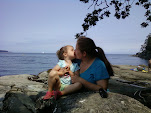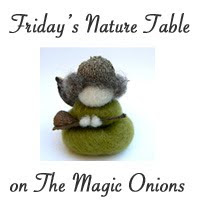As I mentioned in a earlier post we went to a parents evening at L's Montessori preschool about How to Grow a Child's Brain. My husband and I were totally impressed and I thought I'd share some of what we learned.
The presentation was by a wonderful Brain Based Learning Facilitator named Gary Anaka. He entertained and enlightened us by using techniques such as Brain Gym exercises and audience participation with physical movements and repetition. Even my skeptical husband was enthusiastically applauding and saying thank you at the end.
What I found most useful was the list of Brain Boosters he gave us to help grow a child's brain. These are what I'm going to share with you.
What Gary said is our motive as parents is to grow your child a three pounder! That's a brain we're talking about. Early childhood is the most critical time for brain development. Oh and for those of us over thirty he said our mission is to try and keep our three pounder : )
So here are the top ten brain boosters according to Garry Anaka
1. Movement-the number one most important thing for a child's development. Get your child moving and outside. Walking, running, jumping anything to get them going. This is why sitting at a computer or sitting watching TV are more brain killers than boosters. Movement helps and is essential for learning. It's amazing how Maria Montessori got it so right!
2. Learning-a child needs to be constantly learning new things. Repetition is the key so read those books over and over until your child can recite them back to you. That is your child's brain growing!
3. Nourishment-It's essential that your child gets enough oxygen(fresh air), water and a proper diet. Some brain boosting foods he suggested are walnuts, avocados, apples, blueberries,bananas, dark chocolate and dark leafy greens like kale.
4. Safety-a child needs to feel safe in his or her environment before their brain is able to start learning and developing. If a child is constantly in the fight or flight part of their brain because they feel threatened they are not able to develop. So the next time you are about to loose control and yell at your child or get into a yelling match with your husband take a deep breath and think of the negative consequences it's going to have on your child's brain.
5. Play for fun-I love this one. Something that is so important is unstructured play, outside in nature. This is where I love the Waldorf philosophy. Gary says children should be allowed to play without parents always setting rules and structure to games.
6. Reading-Reading to your children or having them read is so important. Apparently it takes a child hearing 1000 stories before he or she is able to read.
7. Story Telling-This is also where I like the story telling elements of Waldorf so much. He gave us a quote from Einstein "Imagination is more powerful than knowledge"
8.Experience-"rich experience grows a rich brain" Gary Anaka
9. Novelty-novelty grows the best brain so remember to spice up your routine and do something different every once in a while
10. Caring-I know that everyone who reads this blog does this already as they are taking an interest in their children. Love, attention and affection.
So there they are. Nothing we didn't know already but it's sure nice to have them all affirmed knowing we are on the right track and our child's brains are growing every time we do one of these things that comes so naturally to us.
Here are a few websites he suggests to check out:
www.mindworkspress.com if you go to the SPECT Atlas part you can see fascinating brain scans showing the effects of different things on the brain such as drugs and alcohol and abuse.
www.brainplace.com
http://www.brain.com/
Thursday, 23 September 2010
Subscribe to:
Post Comments (Atom)




8 comments:
This a great post! Thank you! I am more and more interested in Waldorf education, could you suggest a book or another resource about it?
That is so very true!!My favorite is number 8...so very true!
Maria Montessori was right when she say that Movement is the first step for learning. Our legs and our arms are very powerful.
I love using the Waldorf method with my daughter,loving nature is the best way to understand where we came from.
Nature play is the best way to develop imagination.I think.
Sandy here are couple of books I can recomend about Waldorf Education.
-Rudolf Steiner Education and the Developing Child. by Willi Aeppli.
-A child's Seasonal Treasury.by Betty Jones.(this last books is about poems,rhymes,songs,art and games in the Waldorf method).
Hi Sandy. I started to really become interested and want to learn more about Waldorf after reading the blog Childhood Magic(which is unfortunately no longer around). She totally inspired me and I started reading other Waldorf blogs such as The Magic Onions and 5 Orange Potatoes. There are tons of them out there. So far I haven't read any books on the subject. Thanks Olives and Pickles for the suggestions : )
What I find most appealing are the arts and crafts,handwork and connection with nature.
Love it! so true and feels so right.
We start the day with brain gym and fish oil, throw in a bit of care, love and off we go...brains all primed and ready! (:
Actually to tell the truth not much brain gym has been done since Little Grub was born - gotta start it up again.
xx
All very true! I see a lot of similarities to Charlotte Mason as well. She emphasized long hours of outdoor play. If more of our friends were around, we wouldn't have to sign up for classes to socialize! They would have much more fun playing freely. The riches memories I have (and learned the most) was when we were outdoors. All the academic stuff will be easily forgotten but not the rich hands on experiences!
Hi again! just came back to thank you for the suggestions : )
What a succinct list! Outside time, exercise, reading and a good diet didn't surprise me. Some of the interesting ones were novelty, experience and storytelling. While I can see how all of these would be valuable to add to a child's growing up years, do you know if the presenter had research to back up his recommendations?
Also interesting is how he has recommended both repetition and novelty... Everything in moderation, I guess!
fantastic post. thanks for sharing :)
Post a Comment